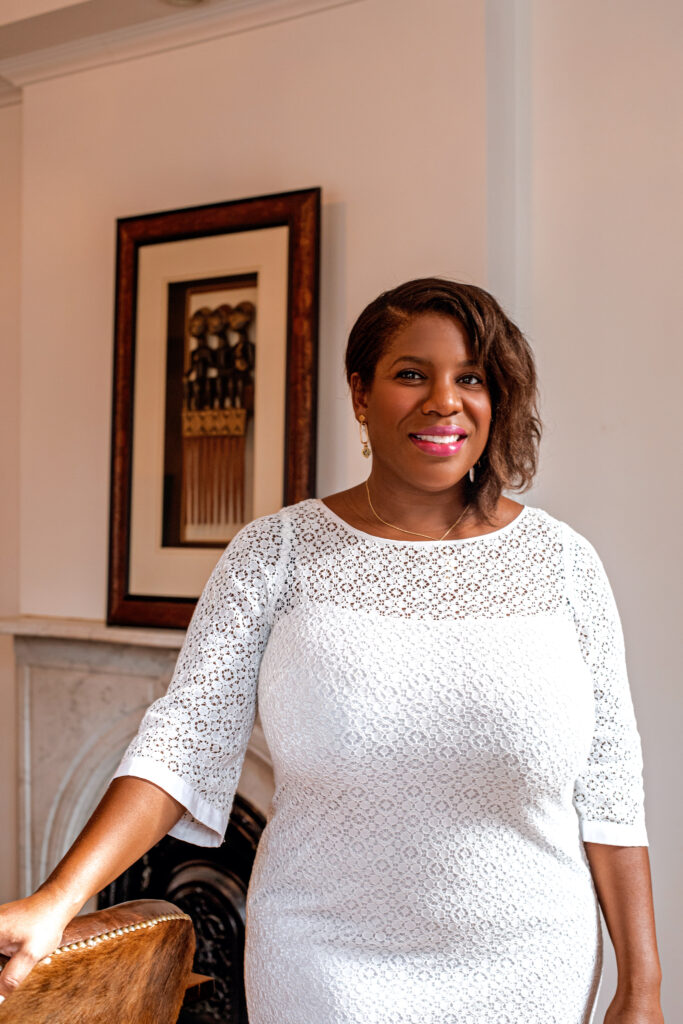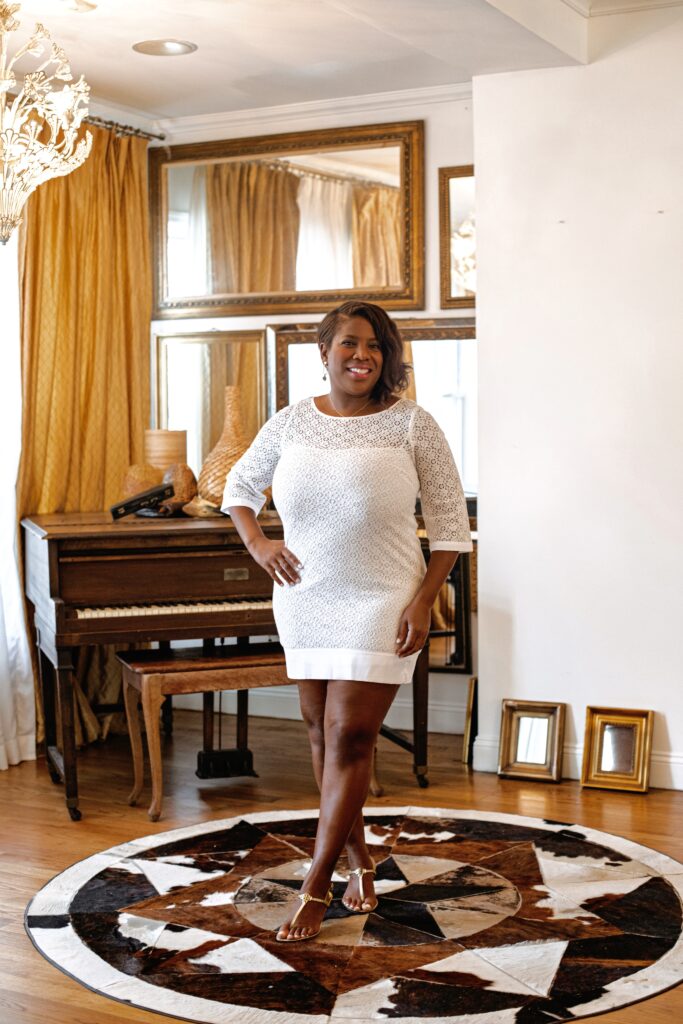“The number one way to gain wealth in this country and generally through the world is real estate, period . . .”
What is your occupation?
Historically, my background is in accounting and finance. When I finished college, I was an accounting and finance major. So I worked at KPMG as a real estate auditor. That really gave me a lot of my real estate, business backing, and knowledge. I did that for a couple of years before going to law school. And then went to Georgetown Law School. And while it’s very general, my focus after law school was immediately in real estate law. I’m a real estate investor… I did work at KPMG as an accountant and author for law school. And after law school, I went to work for law firms in New York City for about five years. And then I went on my own in 2006. So I’ve been out there for a while on my own.
Would you also share your nationality and your cultural background?
Sure. I’m Black, but my family is Jamaican. Both my parents were born and raised in Jamaica, and they came to the U.S. to go to college. So my dad went to Howard and my mom went to Catholic and then they both got their masters at Johns Hopkins University. I was raised in the D.C. area and stayed there until I finished law school, and then moved to New York for my first post-law school job.
How long have you owned your brownstone now?
My current house, I bought it in 2008, and then renovated [it] and moved in 2009.
Can you start from the very beginning and sort of tell us the path to your ownership story?
When I was in law school, I bought my first condo in D.C. And then I bought a few condos in D.C., and the building I was living in just happened to be converting from [being a] rental to [a] condo, so it was a great opportunity to go into an investment with very little cash because I had no money. And obviously, this [was a] really great first-time homebuyer program. And if there’s a conversion from rental to condo, it’s perfect because if you live in the building, they pretty much need to work something out for you. So that was how I really started out with purchasing.And once you get your first place with any kind of first-time homebuyer program, or any other kind of tenant conversion program, if there’s good equity in the place, it opens the door to the next level of investment. B
…I bought that first condo for $96,000. And within a couple of years, it was worth $300,000That gives you the opportunity to refinance and take out cash. And that’s how I, you know, was able to invest in my second home, which turned out to be my main home in New York when I moved there.
I’ve never been a great saver so I’ve never saved for a downpayment. And I know a lot of people work really hard and they’re like, “I don’t want to do anything until I save for this downpayment,” but saving is not easy. [Especially] in New York if you live in New York. I came out of Georgetown Law, I paid for it myself. So I had six figures in debt. I was making probably the best salary for anybody coming out of school at that time. But I’m in my 20s and even if you’re making—like at that time, I think I made $150K plus bonus—so it may have been $190K, that’s excellent for a 20-something year old, right? By the time I paid my student loans, and then hung out, there wasn’t much left. So I wasn’t saving; it really had to come from getting creative with either pulling off of another property, which is what I did in D.C. Or another thing was, I tell anybody, I don’t think I’m supposed to but, if you have good credit, there’s a world open to you. So I mean, America, at least, is open. If you have strong credit, you can pretty much get a credit card with a line of credit on there. And with that, there’s always an offer for cash back, then you’re able to use it for home improvements or whatever else. And I would just use that to add my savings “savings.” And that’s what you use for different investments or to buy your house.
Can you tell me how the community around you has changed since you moved in? In ‘09?
I can even go back to 2002 because that’s where I really see the change, because I was just a block away, if that makes it easier. But I moved in in 2002. It was an up and coming neighborhood. But I was on Myrtle and Waverly. And now Merle in Washington. So it’s just a block away. But it was not the coolest block. We didn’t have Bank of America…We didn’t have any of these, like really cool spots. We did have Citibank and a lot of other things that were kind of local. And then you still had a lot of crackheads in the neighborhood.
So it was like, 2002, Brooklyn was a little different.My part of the neighborhood wasn’t that close to the train. I had friends that were closer to the sea, I was closer to the “T”, which at that time was horrible. But it just got better. And the bus line got better. Pratt Institute has been there forever. But it became, I guess, it’s just been so busy with their foreign student program. And then you see an influx of like, lots of different races. And if I didn’t own my place, I’d be really pissed. If I didn’t own my place, and several other places in the neighborhood, I’d be ticked off because the prices are much higher.
You have a lot of people that used to live in the city thinking Brooklyn now is cool, where before they wouldn’t even come to Brooklyn, and then trying to change what the standards are, how loud you play your music, like, what do you do? And that part of it is like the bullshit that comes with junk gentrification, right? When you own your place, dude, there’s nobody that can tell you what to do. Like even the police department isn’t allowed anymore to come under de blasio. They can’t come into your house on the noise complaint. It’s just they can’t come in, nobody can do anything. So you’re in much more control over what you do, and what you can do.
If things get tough, or like me, I split my time between Miami and New York. So if I don’t want to be in New York for six months, I can rent out my house. That might be harder if I had a rental to sublet. So, yeah, the neighborhood’s changed in good ways. There’s a lot more access, Mr. Coco Myrtle, there’s a lot of little stuff, but, but I’m not a huge fan of some of the neighbors that have moved in, but then some of the neighbors that were there before weren’t great either. So if you own it doesn’t matter if you own it doesn’t matter.
We used to have parties in the park every Sunday and then the neighbors complained. But if you’re a neighborhood owner, you have your voices as strong or stronger than theirs. And that’s my issue with black people not owning. Because you lose your power. When you’re an owner, you decide what your neighborhood is allowed to do and what we’re not allowed to do.
Do you have a favorite part of your home, and why?
The pool and the hot tub. It was the best investment I made. I think I’ve probably spent under $50,000… for the pool and hot tub, and then maybe another $10[,000] or $15[,000] for the decking around it. It wasn’t terribly expensive. When you think about the fact that I could refinance and pull that cash out at times, but the joy that it gives me and my friends is everything. That’s probably my favorite part of the whole house.
But do you have any more specific advice for a young Black woman in particular? We feel that they’re like too many roadblocks.
I would say, just don’t be afraid to ask people for help. There’s nothing that I’ve done without somebody else helping me a bit. Everything I’ve told you was told to me. And so don’t be afraid to ask, I think that’s wonderful. The black female network is strong. I think that women that have done well, like me and Trisha — and I’m sure a lot of other women that you’re interviewing — have that knowledge to share. And they benefited from that knowledge from other people completely, especially if you’re an immigrant, or from an immigrant family…so don’t be afraid to ask, but then don’t ask if you’re not willing to put in the work because nobody cares anymore.
What do you believe is like the generational significance of home ownership for Black people?
I think it’s power. I think that’s what it comes down to; real estate and homeownership is power. The number one way to gain wealth in this country and generally through the world is real estate, period, and homeownership is almost the only way that people that didn’t create some great invention [can gain wealth]. It’s the number one way the average person creates equity and a positive balance sheet. It’s just the number one way. Even if you have good income from other sources, it’s a wonderful deduction as well…It’s important for Black women to invest in their neighborhoods, because it makes no sense for us to complain about what we can and cannot do in the park or what we can do on the street without getting involved.
But if we all do it collectively, I think, you know, I mean, Black women are becoming the most educated women in the country. So why wouldn’t we be the most powerful in politics and finance. And that’s really the driver of everything. Finance drives this country. So even if you don’t want to be a politician and set the tone for what was happening in the police force, where else if your financial backing is strong, you can influence the people that are making those decisions. If collectively, Black women have that financial power, then there’s no reason that we shouldn’t feel protected and safe. Because then at that point, you’re the taxpayer, you’re the one that’s paying the police department, you’re the one that’s playing for the city. Official, you’re donating to their campaigns, you’re involved. But you can’t be involved if you’re not owning your property or or businesses in the area. There’s nothing, nobody cares what you say.
The article has been edited and condensed for clarity.


